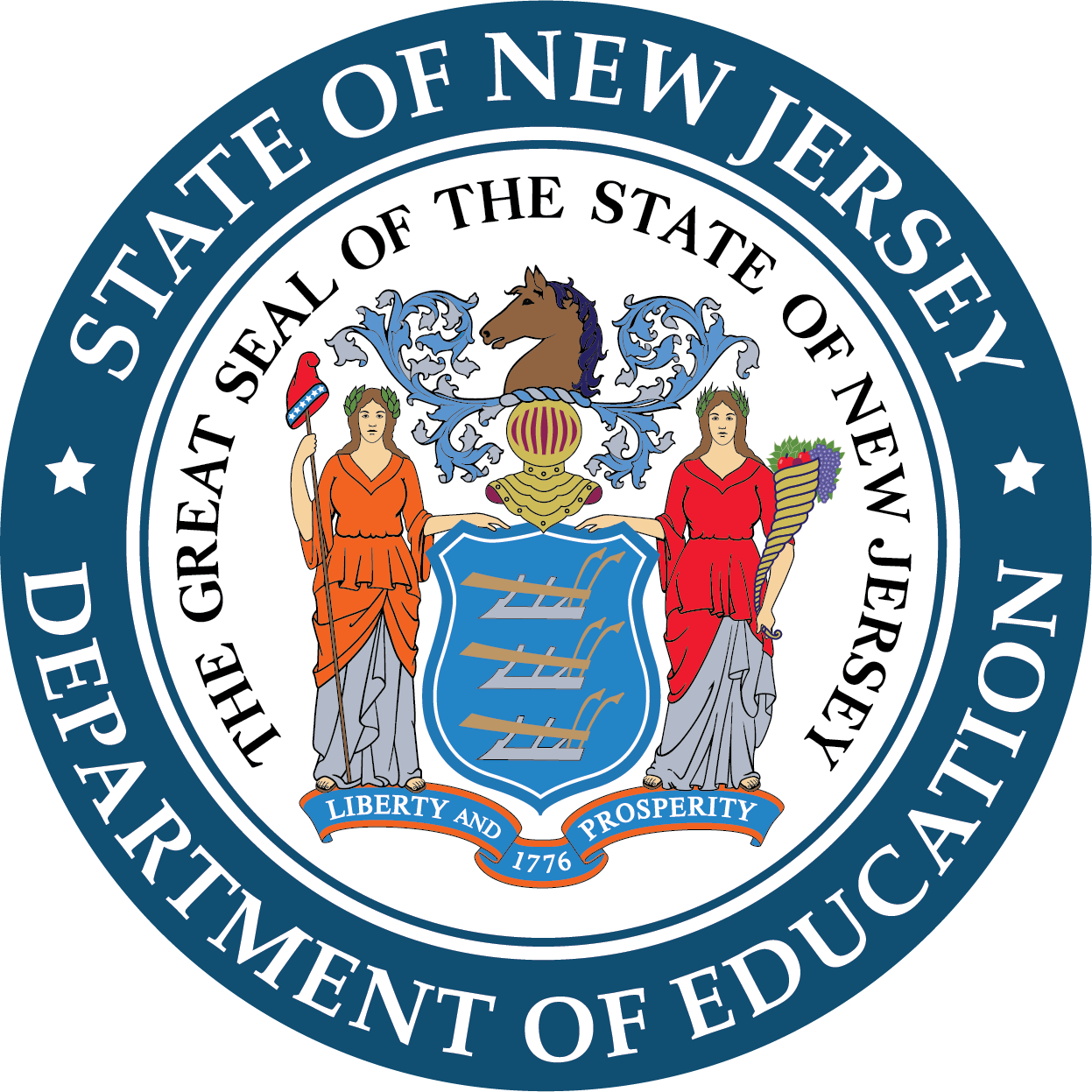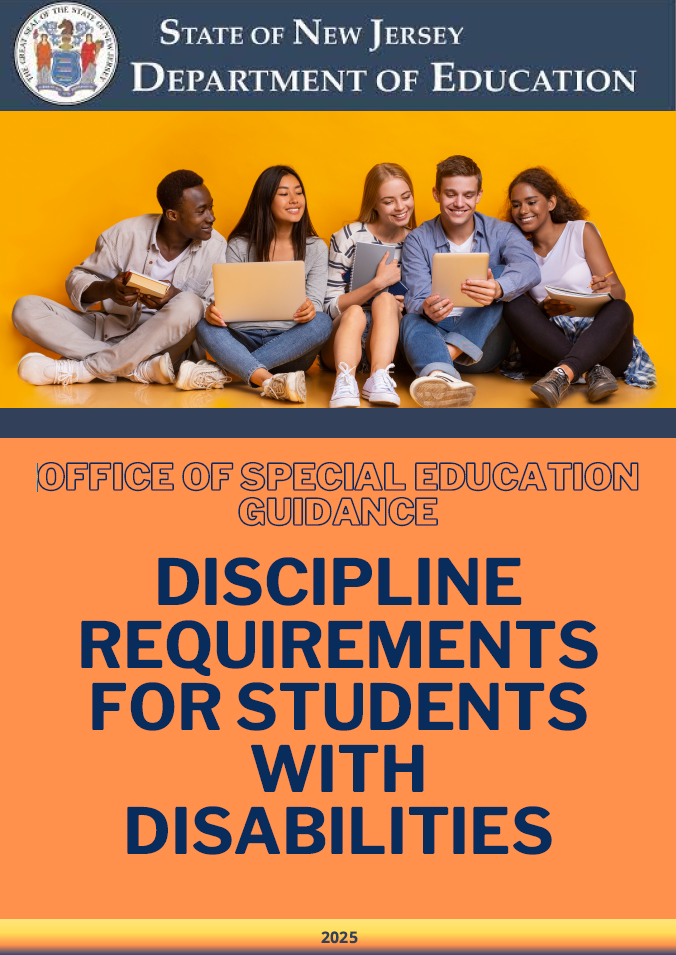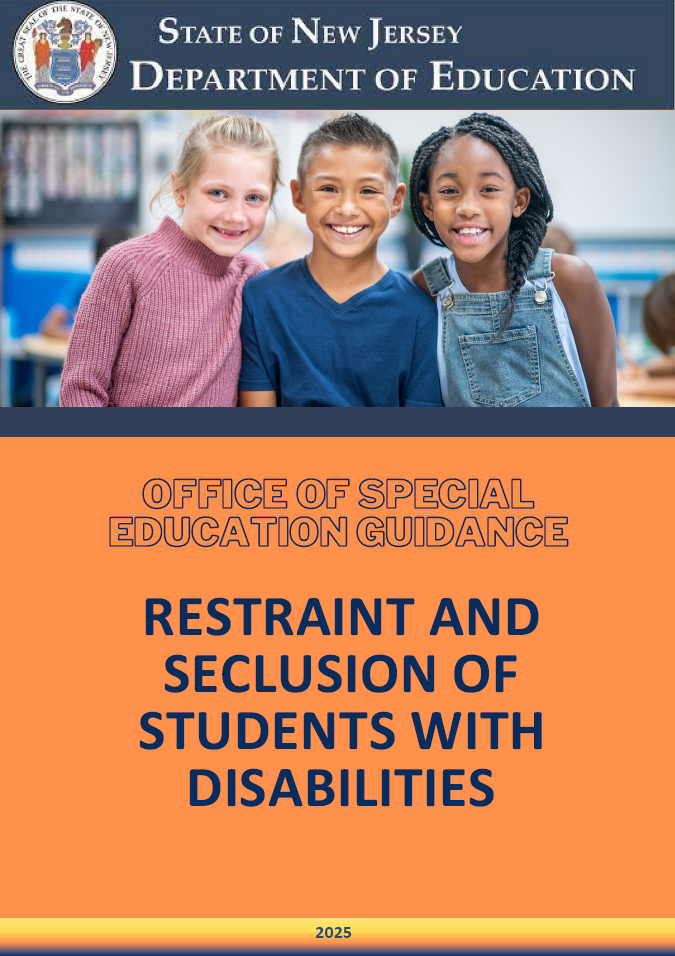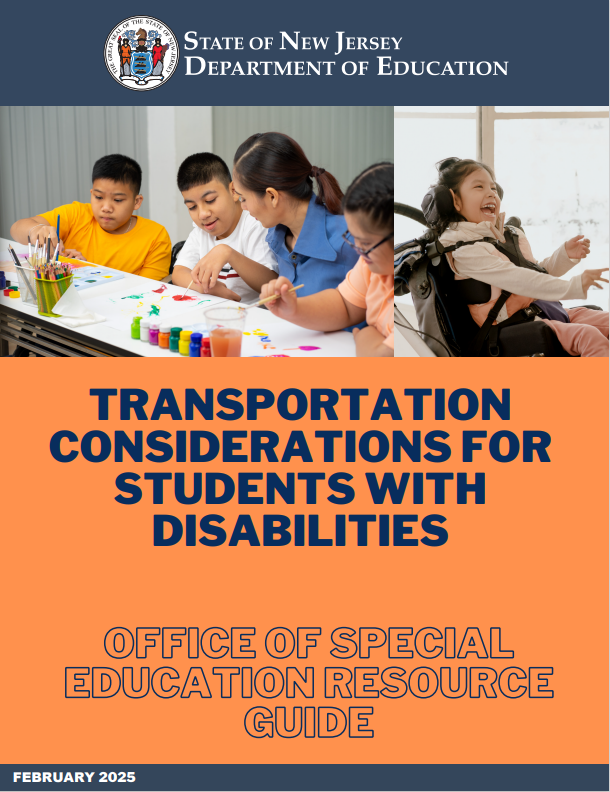
Policy and Procedures in Special Education
The Office of Special Education (OSE) implements state and federal laws and regulations governing special education to ensure that students with disabilities in New Jersey receive a free and appropriate public education (FAPE). The office provides statewide leadership through the development of policy and documents, and provides guidance to school districts and parents regarding the implementation of special education programs and services. The office monitors the delivery of special education programs operated under state authority, provides mediation services to parents and school districts, processes hearings with the Office of Administrative Law, and conducts complaint investigations requested by the public. In addition, the office funds regional learning resource centers (LRCs) that provide schools and parents with information services, materials circulation, technical assistance, consultation services and production services. The office also provides technical assistance on topics related to students with disabilites and the development of Individualized Education Programs (IEPs) and accessing individual rights.
Click here to access the "Special Education Directories".
- Bilingual Child Study Team Professionals
- Approved Community Transition Programs
- Approved Private Schools for Students with Disabilities (In State)
- New Jersey Public-College-Operated Programs for Students with Disabilities
- Approved Private Schools for Students with Disabilities (Out of State)
- Approved Clinics and Agencies
- Educational Programs and Resources for Students Who Are Deaf or Hard of Hearing in New Jersey
Visit the Office of Special Education's (OSE) NEW! Alternate Assessment Website
Assessment Quick Links
- NJDOE Office of Assessments
- NJSLA Resources for Districts
- Homebound Testing Procedures
- NJSLA Accessibility and Accommodations Manual, 7th Edition
Dynamic Learning Maps (DLM)
The alternate assessment for students with the most significant intellectual disabilities in English Language Arts, Mathematics, and Science is called the Dynamic Learning Maps (DLM). The state of New Jersey and other states are working with the University of Kansas to implement this assessment system. Periodically, the DLM or the Department of Education will send updates to Chief School Administrators in order to help districts prepare for the online computer-based assessment. The DLM test specifications and Essential Elements skill statements, used for instruction and assessment, are currently available and accessible via the DLM website. All districts are asked to regularly check the DLM website for available information including test design, technology requirements, required training materials, professional development modules, and assessment timelines for the operational testing year. For information on the DLM, go to the Dynamic Learning Maps New Jersey website.
- NEW! New Jersey's "Reducing the 1% Participation Rate Action Plan" (2024)
- Additional NJDOE DLM Resource Page: Dynamic Learning Maps (DLM) (nj.gov)
- District Training for those Exceeding 1% Cap (NJDOE Video)
- Access to DLM Training and Reporting Forms (forms located on page 3)
Graduation Assessment Requirements
On June 5, 2019, the New Jersey Department of Education (NJDOE) updated the high school graduation assessment requirements in both English language arts (ELA) and mathematics for the classes of 2019 through 2022, pursuant to an amended Consent Order issued by the Appellate Division of the Superior Court of New Jersey.
The requirements listed for the classes of 2023–2025 were adopted by the New Jersey State Board of Education on September 8, 2021.
Portfolio Appeals
In past years, students with disabilities may not have participated in the portfolio appeals process. Students with disabilities, through the Individualized Education Program (IEP) may have graduation requirements waived or modified and receive a state-endorsed diploma. An April 28, 2021 NJDOE Broadcast Memo stated that, beginning in the 2020-2021 school year, students with disabilities who do not meet all standard graduation requirements will receive a diploma but will not be included as graduates for federal reporting.
Students with disabilities who are unable to demonstrate proficiency on the statewide assessments required for graduation can participate in the portfolio appeals process. Students with disabilities who demonstrate proficiency through portfolio appeals will receive a diploma and will be included as a graduate for federal reporting. It is recommended that, as appropriate, districts encourage students with disabilities to participate in the portfolio appeals process if they have not yet the graduation assessment requirement for ELA and/or mathematics.
ACCESS for English Language Learners (ELLs)
New Jersey, as a member of the WIDA Consortium, uses the ACCESS for ELLs suite of assessments as a tool to measure English Language Learners (ELLs) proficiency in the English language. Students are assessed in four domains: Speaking, Listening, Reading, and Writing.
- NJDOE Assessment Access Testing
- For the most updated information on the ACCESS assessments, please visit the New Jersey WIDA state page.
- Accessibility and Accommodations Supplement (WIDA, 2020)
NJ Electronic Web-Enabled Grant System (EWEG)
Reports, Guidance and Timelines
Resources
- Elementary and Secondary School Emergency Relief (ESSER) Federal Funding Dashboard
- Maximizing Federal Funds Resource
- NEW! IDEA Allowable Uses Resource Document (2024)
Allocations
Grant Documents
- Attachment A: General Directions for the IDEA Online Final Report
- Attachment B: Unexpended Funds (Carryover)
- IDEA Guidelines (PDF)
- Consortium Designation Form (Must be submitted prior to creating the grant application)
- IDEA Renovation/Construction Form (Must be uploaded in the application)
- Excess Cost Calculation
- Public Access Instructions for the Electronic Grant System (coming soon)
- IDEA-B State Fiscal Year 2026 Entitlement Allocations and Electronic Grant Application Information (Released: June 9, 2025)
- IDEA-B Grant Awards and Allocations (FY 2026)
- 2026 Nonpublic Verification Form (This document should be submitted no later than October 1st)
Additional Funding and Grant Opportunities
- American Rescue Plan Act of 2021 Individuals with Disabilities Education Act Electronic Grant Application Information
- Coronavirus Aid, Relief, and Economic Security (CARES) Act - ESSER I
- Coronavirus Response and Relief Supplemental Appropriations - ESSER II
- American Rescue Plan Elementary and Secondary Schools Emergency Relief - ARP ESSER
- New Jersey Department of Education's Office of Grants Management
- Forecast of Funding Opportunities under the Department of Education Discretionary Grant Programs for Fiscal Year (FY) 2022
- Additional Federal Forecasted and Posted Grant Opportunities
Guidance Regarding Changes to the Due Process System in the Individuals with Disabilities Education Act of 2004 (NJDOE/OSEP, July 2005)
Presentation on "Guidance for the Implementation of IDEA 2004" (NJDOE/OSEP, July 2005)
Links to important references and resources on the Re-authorization of the Individuals with Disabilities Education Act (IDEA).
The Individuals with Disabilities Education Act (IDEA) is the primary federal program that authorizes state and local aid for special education and related services for children with disabilities. On December 3, 2004, President Bush signed the Individuals with Disabilities Education Improvement Act (P.L. 108-446), a major reauthorization and revision of IDEA. The new law preserves the basic structure and civil rights guarantees of IDEA but also makes significant changes in the law. Most provisions of P.L. 108-446 go into effect on July 1, 2005. The requirements regarding "highly qualified" special education teachers became effective immediately upon signature.
H.R. 1350, Individuals with Disabilities Education Improvement Act (IDEIA):
- Key Provisions (NJDOE/OSEP Document)
- USDOE/OSEP "One Pagers" for descriptions of 16 areas addressed in IDEA 2004. The "one pagers" provide a useful reference for each of the topics covered, and set forth a short and concise explanation of provisions of IDEA 2004 as they pertain to each of the 16 areas.
- Alignment with the No Child Left Behind Act
- Discipline
- Disproportionality and Overidentification
- Changes in Initial Evaluations and Reevaluations
- Early Intervention Services
- Highly Qualified Teachers
- Individualized Education Program (IEP)
- Individualized Education Program (IEP) Team Meetings and Changes to the IEP
- I – Procedural Safeguards Regarding Surrogates, Notice and Consent
- II – Procedural Safeguards Regarding Mediation and Resolution Sessions
- III – Procedural Safeguards Regarding Due Process Hearings
- I – State Funding
- II – Local Funding
- Part C Option: Age 3 to Kindergarten Age
- Children Enrolled by their Parents in Private Schools
- Statewide and District-wide Assessments
Resources:
- Federal Office of Special Education Programs (OSEP)
- The Office of Special Education Programs (OSEP) is dedicated to improving results for infants, toddlers, children and youth with disabilities ages birth through 21 by providing leadership and financial support to assist states and local districts.
- National Association of State Directors of Special Education (NASDSE)
Purchase a 200-page document that is a side-by-side that compares current law to the Individuals with Disabilities Education Improvement Act of 2004.- Council on Exceptional Children (CEC)
Latest information on the reauthorization of the Individuals with Disabilities Act (IDEA) 2004 including summary and analysis of the new IDEA, press releases on the bill, and a link to the bill itself.
Rules and Regulations
- State-Imposed Rules, Regulations and Policies Not Required by IDEA or Federal Regulations (February 2024)
- Questions and Answers on Serving Children with Disabilities Placed by Their Parents in Private Schools (February 2022)
- Section 504 Of The Rehabilitation Act (504 “Committees”) (state.nj.us)
- NEW! Student Records Guidance for New Jersey (2024)
- NEW! Transportation Considerations for Students with Disabilities (2025)
Least Restrictive Environment
To the maximum extent appropriate, children with disabilities, including children in public or private institutions or other care facilities, are educated with children who are not disabled, and special classes, separate schooling, or other removal of children with disabilities from the regular educational environment occurs only when the nature or severity of the disability of a child is such that education in regular classes with the use of supplementary aids and services cannot be achieved satisfactorily.” 20 U.S.C.§1412(a)(5)(A).
- Code Reference - 6A:14-4.2 Placement in the least restrictive environment
- LRE Monitoring Data Collection Form
- Resources for Least Restrictive Environment
- Least Restrictive Environment Resource Brief (IRISCenter)
- Early Childhood/Preschool Least Restrictive Environment (ECTACenter)
- Guidance and Resources for Developing an Effective IEP and Determining Least Restrictive Environment (NJDOE)
- New Jersey Settlement Agreement (LRE Lawsuit Implementation)
Disproportionality
Disproportionality is the over representation of specific racial/ethnic groups in special education and is a United States Department of Education priority area. It is a complicated issue with which state education agencies and school districts across the county work hard to address. Each year New Jersey's Office of Special Education (NJOSE) conducts a data analysis to determine whether a district meets the criteria for disproportionality. Those districts that are identified with disproportionality receive guidance and technical assistance from the NJOSE.
Data Reporting
- NJ Optional Data Collection Tool (for district use)
- NJ Significant Disproportionality Reporting Form
Disproportionality Resources
- Significant Disproportionality Reporting Under IDEA Part B
- A Comparison of Mandatory Comprehensive Coordinated Early Intervening Services (CCEIS) and Voluntary Coordinated Early Intervening Services (CEIS)
- Identifying and Addressing Contributing Factors
- Quick Reference Guide on Coordinated Early Intervening Services
Discipline Requirements
- USOSEP Discipline Dear Colleague Letter (July 2022)
- USOSEP Discipline Q & A (July 2022)
- Positive, Proactive Approaches to Supporting Children with Disabilities: A Guide for Stakeholders (USOSEP Policy Support 22-01 TA guide)
New Jersey Department of Education Guidance and Resources
- Code Reference - 6A:14-2.8 Discipline/suspension/expulsions
- New Jersey Compilation of School Discipline Laws and Regulations (USED, 2021)
- Manifestation Determination
- Overview of Discipline Procedures for Students Receiving Special Education
- Public Law, 2016 Chapter 45; 18A:37-2c
- Student Suspension and/or Expulsion Guidance for Early Childhood/Young Students
National Discipline Resources and Considerations
 Official Site of The State of New Jersey
Official Site of The State of New Jersey




